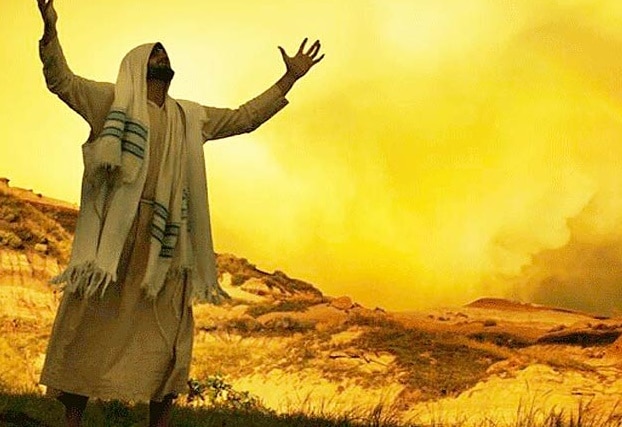The 7 Words of Jesus Pronounced on the Cross
The 7 Words of Jesus, which were pronounced on the cross of Calvary, have a great spiritual and biblical meaning since each one of them expresses the fulfillment of the will of God in the life of Jesus. In the following article we will know the full meaning of each of the 7 words of Jesus expressed at the moment in which he was crucified on the cross.
The Seven Words of Jesus
The 7 words of Jesus mostly known as the “Septem Verba in Latin” becomes the denomination in a conventional way of the last 7 prayers that our Lord Jesus came to pronounce in the course of his crucifixion, just before he died, as it is they come to collect in the canonical Gospels.
The first 2, found in Matthew and Mark, are the ones that only mention 1, which is the 4th word. The one in the book of Luke comes to relate about 3 words that are, the 1st, the 2nd and the 7th.
In the book of John, the remaining 3 words are collected, which are the 3rd, the 5th and finally the 6th. He cannot determine the chronological order. The traditional order tends to be according to the Spanish translation of the Jerusalem Bible:
- First Word: “Father, forgive them, for they do not know what they are doing.” – In another translation it says: “Pater dimitte illis, non enim sciunt, quid faciunt”. Book of Luke 23:34.
- Second Word: “I assure you: today you will be with me in Paradise.” – In another translation it says: as follows: “Amen dico tibi hodie mecum eris in Paradiso”. Book of Luke 23:43.
- Third Word: “Woman, there you have your son. Son, there you have your mother”. – In another translation she says: “Mulier ecce filius tuus […] ecce mater tua”. Book of John 19:26 – 27.
- Fourth Word: “My God, my God! Why have you abandoned me?” – In another translation he says: “Elí, Elí! lama sabactani? Book of Matthew, 27:46 – Another Translation also says: “Deus meus Deus meus ut quid dereliquisti me”. Book of Mark 15: 34.
- Fifth Word: “I thirst.” – In another translation he says: “Site”. Book of John 19:28.
- Sixth Word: “Everything is finished.” – In another translation he says: “Consummatum est”. Book of John 19:30.
- Seventh Word: “Father, into your hands I commend my spirit.” – In another translation he says: “Pater in manus tuas commendo spiritum meum”. Book of Luke, 23:46.
The same evangelical text of the Bible is the one that attributes to these “words” a kind of end of fulfillment of the prophecies that are described in the Old Testament: knowing that everything was already fulfilled, and for the Scripture to arrive to fulfill until the end this is what the book of John 19:28 says. Also in the part of the Catholic belief it is known as the Sermon of the 7 Words of Good Friday .
first word
The first word of the 7 words of Jesus that he pronounced on the cross of Calvary was the one that we can find in the book of Luke Chapter 23 verse 34 that says:
“Father, forgive them because they dont know what they are doing”.
Luke 23:34.
This expression of prayer came to be offered by Jesus for all those who were guilty of putting his life in danger by causing certain death. It can be translated to mean that it was addressed to all the Jews who were in that place and to the Roman soldiers who were playing their clothes in games of dice to see who would stay with them.
The 2 select groups or, generically, humanity itself as a whole are the ones that are included in this prayer of Jesus addressed to the heavenly father who is observing everything that is happening on earth with his beloved son.
Prayer:
Even though I have become your enemy, my Lord Jesus, I truly confess that I need you to pray for me because, with that, I was sure to get God’s forgiveness. When I was wrong and I offended you, I didn’t know what I was really doing, be my Jesus my Lord that you pray before the Father of Heaven for me.
My God and Lord, that for my love you came to agonize at the moment you were on the cross of Calvary to pay the debt of all my sins with the price of your blood, and at the same time you opened your mouth to be able to make me attain the forgiveness of divine justice. Amen.
second word
The second of the 7 words of Jesus that came to pronounce on the cross of Calvary was the following:
“I assure you: today you will be with me in Paradise.”
Luke 23: 43.
It is about Christ’s response to the plea of one of the thieves who was crucified next to him, who told him “remember me, when you come into your kingdom”, since at that moment the thief was repentant. With this it can be interpreted that he assures him of salvation in such a way because he had repented with all his heart, without there being an obstacle in his past sins, because of the faith that he has placed in the Lord. Jesus Christ.
Prayer:
On this day I turn to you as the thief did who with faith came to implore your mercy, at this moment I ask you in the same way, oh my Lord, your forgiveness for all my sins. If you gave the repentant thief himself a special place in your heavenly kingdom, in the same way I ask you to have a place for me in your kingdom, so I ask your salvation for my life today. Amen.
third word
The third of the seven words of Jesus on the Cross that he pronounced is the following:
“Woman, there’s your son. […] Son, there you have your mother”.
John 19:26 – 27.
One of the first indications that can be observed in this passage becomes the ethical sense and also the social one that is: That Christ came to deliver the care of his mother to his beloved disciple John, coming to fulfill an elementary filial duty. You can see the teaching that one must attend to “the things of the kingdom” to which John is sent, without having to neglect the responsibilities that were established beforehand.
If you love God, you will love your neighbor and he himself will be cared for, however, it is mainly done with those closest to you. In our beloved Lord Jesus was the duty of caring for his mother, who at that time was a widowed woman.
If she did not have other children, which is the absence of Jesus’ brothers, he only entrusts her to his beloved disciple John, who gives her as mother. This type of act only implies that she must not only receive love, but also know how to give it regardless of the circumstances.
A large number of Mariological claims have been made regarding this biblical passage. According to Raymond Edward Brown, this man comes to describe the following:
“It seems absolutely incredible that such a revealing and dramatic scene, which places the mother of Jesus in a new relationship with the beloved disciple, ends with him simply taking her home. […] The meaning of this episode lies in the new relationship between the mother of Jesus and the beloved disciple”.
According to Francis J. Moloney, he mentions that:
“You cannot avoid the fact that Jesus crucified created a new family from the cross.”
In the space of the 3 verses in the book of John chapter 19 verses 25 to 27, the term “mother” occurs no less than 5 times.
Prayer:
Thank you, beloved Lord, because at all times you only expressed love and concern for everyone, including your mother, who you gave her as a commission to be cared for by your beloved disciple, so we can have full confidence that you will always take care of me. and you will intercede at all times before the father for me. Thank you my Jesus for your great love expressed on the cross of Calvary. Amen.
fourth word
Another of the 7 words of Jesus that he pronounced on the cross of Calvary was the one that is considered as the fourth that says:
“Eli, Eli, lama sabactani? […] My God, my God, why have you forsaken me?”
Mark 15: 34 and Matthew, 27: 46
This appears in the Gospel of Mark which is the oldest in the Aramaic language that says “Elohi, Elohi, lema’ Sebaqtani”, and also in the Gospel of Matthew in the Hebrew language that says: “Eli, ‘Eli, motto’ Sebaqtani”.
According to the typical interpretation, Jesus would be found reciting what is known as Psalm 22, which begins with just those words. For the theological experts, Jesus has given himself freely to sacrifice for all humanity, and in his human nature there comes a time when he feels abandoned, as he had come to express in the Gestemaní.
He is the Suffering Servant of God, yet finally comes to accept vicarious sacrifice for all mankind. The suffering of Christ is what symbolizes in the same way the suffering of the human being even in the greatest of faith.
For what historical criticism is, this phrase, or at least what it expresses, tends to be probably historical, coming to meet the criterion of multiple attestation, this being the fact that it is the only one of the 7 Words of Jesus that appears in more than 1 of the gospels and the one with the greatest difficulty because, given its type of character of desolation, it is usually feasible that the early Church experienced some kind of difficulty in being able to accept this phrase in the Gospels. lips of Christ
However, in the same way, it is thought that although the idea becomes authentic, this becomes, that the historical Jesus would have felt truly abandoned at the moment of his death, simply waiting for an intervention from of God his Father who never came.
The many other inserts of what is Psalm 22, along with that of Isaiah 53, can succeed in making people think of the Passion story as a kind of a posteriori composition starting from the Old Testament passages, albeit with some really historical types of elements.
It can be said, in a few words according to the revelation given by the Holy Spirit, that Jesus at that moment felt separated from the presence of his father because of the great amount of sin that was falling on him. That is, Jesus was separated from the presence of Two because of sin, since a person full of sin cannot be in the presence of God because God hates sin but is not a sinner.
Prayer:
Lord I ask you to forgive me that because of my sins that you saw and carried at that moment on the cross of Calvary you were separated from the Father who is in heaven as a consequence of the great number of sins that you carried at that moment, for what I ask you, my beloved Lord, to forgive me and to guide me at all times to always value that great sacrifice of yours on the cross of Calvary. Amen.
fifth word
The one that is considered as the 5th of the 7 Words of Jesus that he expressed on the cross of Calvary is the following:
“I’m thirsty”.
John 19: 28.
This is interpreted as a kind of expression of 2 types of longing for Christ himself on the cross of Calvary. In the first term, it is interpreted as a physiological thirst, which consisted of 1 of the greatest torments that were applied to the crucified.
In the second interpretation it was in the allegorical sense, as the spiritual thirst of Christ to come to consummate the redemption for the salvation of all humanity. This is what fits in with the structure of the 4th gospel, and it is the one that evokes the spiritual thirst that Christ came to experience at the well of the Samaritan woman.
Prayer:
Lord you were thirsty, at the moment you were on the cross for which I thank you because you suffered all the pain at that moment of your life, you suffered blows, whipping, humiliation, slaps, thirst and anguish all for me so that I could be saved even though I was not yet born.
At this moment I ask you to give me a drink from that source of living water that flows to eternal life, from which your word says that whoever drinks from it will never thirst again. Amen.
Sixth Word
The 6th of the 7 words of Jesus is the one found written in the book of John chapter 19, verse 30 which says:
“Everything is finished.”
John 19:30.
Frequently and it is quoted in the Latin language “Consummatum est”, because this is because it has become a true literary topic according to the scriptural terms, in a pericope.
It can be interpreted that this word is a proclamation in the mouth of Christ of the fulfillment of all that is perfect in Holy Scripture in his very person. This kind of word goes so far as to make it clear that Jesus himself was already aware that he had fulfilled all of his redemptive mission and also that it was the culmination of his life program or purpose in life. this world:
Fulfilling the Scripture by always and at all times doing the will of the Father. More than a simple word of agony, it was a phrase or word of final victory, as if truly saying “everything is finished” .
Prayer:
Thank you my God for having sent your beloved son Jesus Christ to this world with the purpose of giving his life for love of me, thank you my Jesus because you came to the last moment of your life fulfilling the will of God and until the last moment of your life you were simply obedient without replying and without reproaching anything. Amen.
seventh word
The 7th and last of the 7 words of Jesus on the Cross of Calvary is the one located in the book of Luke chapter 23, verse 46 which says as follows:
“Father, in your hands I entrust my spirit”.
Luke 23:46.
This becomes the last sentence that is attributed to Jesus Christ, and can be interpreted as a type of example of the confidence that a Christian should have before entering the spiritual world. This phrase can be interpreted as finally everything is finished, everything was consummated and now I give my spirit to my Heavenly Father to be received by him in the heavenly kingdom.
Prayer:
Just as my beloved Lord Jesus I give his spirit to the father of lights who is sitting on his great white throne in the same way, oh Jesus I give my life to you so that it may be kept from all danger and all evil, that under your protection I know Which I’m safer than under anything else.
Thank you my Jesus for the sacrifice you made on the cross of Calvary, for having shed all your precious blood in that place and that having finished your purposes in this world you simply gave your life into the hands of our eternal creator God. Amen.

Hello! Let me enthusiastically introduce myself as a dedicated blogger fueled by an intense passion for meticulously crafting insightful and well-researched blogs. My mission revolves around providing you, dear readers, with a veritable treasure trove of invaluable information.







